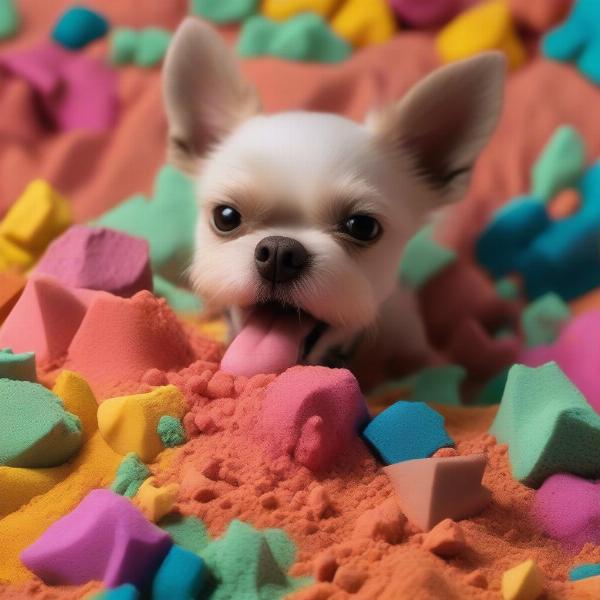Kinetic sand, with its mesmerizing texture and moldable nature, can be incredibly appealing, not just to children, but to our canine companions as well. While generally non-toxic, ingesting kinetic sand can still cause potential problems for your dog. This article will guide you through what to do if your dog ate kinetic sand, potential risks, and preventative measures.
What are the Risks if My Dog Eats Kinetic Sand?
While kinetic sand is primarily made of sand and a non-toxic silicone oil, eating a large amount can still cause digestive upset. The sand itself is not easily digested and can cause blockages, especially in smaller dogs. Symptoms to watch for include vomiting, diarrhea, constipation, loss of appetite, and lethargy. If your dog exhibits any of these signs, contact your veterinarian immediately.
 Dog eating kinetic sand
Dog eating kinetic sand
What Should I Do if My Dog Ate Kinetic Sand?
First, try to determine how much kinetic sand your dog consumed. If it was just a small amount, monitor them closely for any unusual behavior. Ensure they have access to fresh water. However, if your dog ate a significant quantity, or if they start showing any signs of distress, contact your vet immediately. They will advise you on the best course of action. Do not induce vomiting unless instructed by your vet.
How Can I Prevent My Dog from Eating Kinetic Sand?
Prevention is always better than cure. The best way to prevent your dog from eating kinetic sand is to keep it out of their reach. Store it in a securely closed container in a high cupboard or closet. Supervise children playing with kinetic sand, ensuring they clean up thoroughly afterwards.
Is Kinetic Sand Toxic to Dogs?
Kinetic sand itself is generally considered non-toxic. However, some brands might contain additives or colorings that could potentially be harmful. Always check the product label and opt for brands specifically marketed as non-toxic. Even though the sand is non-toxic, the biggest risk comes from the potential for intestinal blockage.
What if My Dog Ate a Large Amount of Kinetic Sand?
If you suspect your dog has ingested a large amount of kinetic sand, it’s crucial to seek veterinary attention immediately. A large amount of sand can cause a serious blockage in the digestive tract, requiring medical intervention. Your vet might recommend inducing vomiting, administering fluids, or even surgery in severe cases.
Will My Dog Be Okay After Eating Kinetic Sand?
In most cases, dogs will recover fully after eating a small amount of kinetic sand. However, the prognosis depends on the amount consumed and the size of the dog. Smaller dogs are more susceptible to blockages. Prompt veterinary care significantly increases the chances of a full recovery.
Conclusion
While kinetic sand isn’t typically toxic, ingestion can still pose risks to your furry friend. Be proactive in preventing access to kinetic sand and seek immediate veterinary care if you suspect your dog has eaten a significant amount. With prompt action, most dogs recover completely.
FAQ
- What is kinetic sand made of? Kinetic sand is primarily composed of regular sand and a type of silicone oil.
- Is all kinetic sand non-toxic? Most kinetic sand is marketed as non-toxic, but it’s always best to check the product label.
- What are the signs of a blockage in a dog? Signs of a blockage can include vomiting, diarrhea, constipation, loss of appetite, and lethargy.
- Should I induce vomiting if my dog ate kinetic sand? Only induce vomiting if instructed by your veterinarian.
- How can I prevent my dog from eating kinetic sand? Store kinetic sand out of your dog’s reach and supervise children playing with it.
- What should I do if my dog ate a large amount of kinetic sand? Contact your veterinarian immediately.
- Will my dog be okay after eating kinetic sand? In most cases, yes, especially with prompt veterinary care.
ILM Dog is a leading online resource for dog owners worldwide, offering expert advice on dog breeds, health, training, nutrition, grooming, and more. We provide valuable and practical information to help you provide the best possible care for your canine companion. For any questions or concerns regarding your dog’s health or well-being, feel free to contact our team of experts. Email: [email protected] Phone: +44 20-3965-8624. Visit ILM Dog for more information.